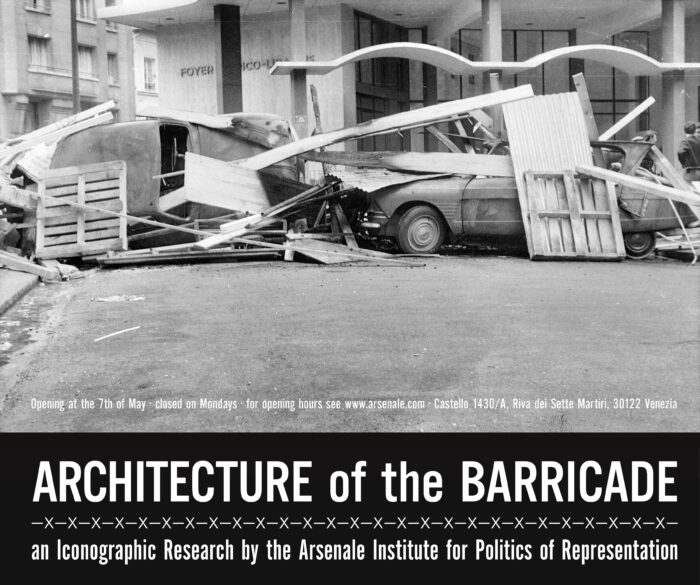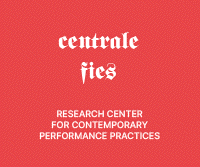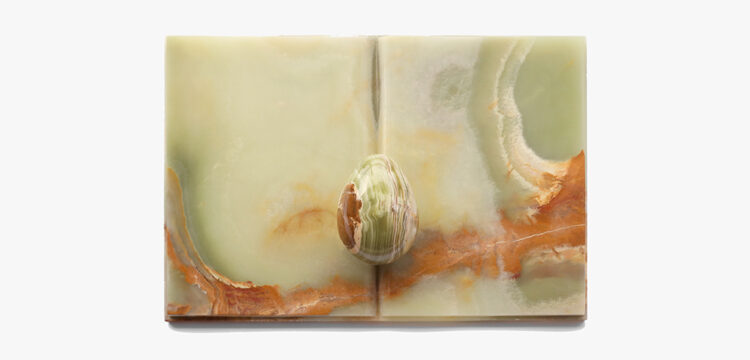Auditions for an Unwritten Opera
A proposal for institutional collectivization through conceptual art
The exhibition Auditions for an Unwritten Opera is on show until October 8, 2023, at the Staatliche Kunsthalle Baden-Baden, to reintroduce the multi-layered oeuvre of the artist Mutlu Çerkez (1964-2005) to a larger audience.
I often imagine museums as time warp machines, where the perception of time meanders across the cultural-emotional environment that is built together by artists, artworks, and audiences. Through this movement, museums deal with a certain level of spectrality, when the raw material of memory is administered in the time-relational form of an exhibition.
The proposition carried by British-born, Australian-Turkish Cypriot artist Mutlu Çerkez was to think of the artwork as the result of a lifelong project of weaving and bond-making that could make visible the fragile matter of time. Çerkez’s curiosity for the work as time-endurance is translated into a conceptual interdisciplinarity that claims transience and repetition as absolute life connectors. Often titling his works with a hypothetical future date upon which they would be remade, the artist proposed a new life for them, a ghostly re-emergence, deviating conceptually from the momentary narration, production, or materiality of art.
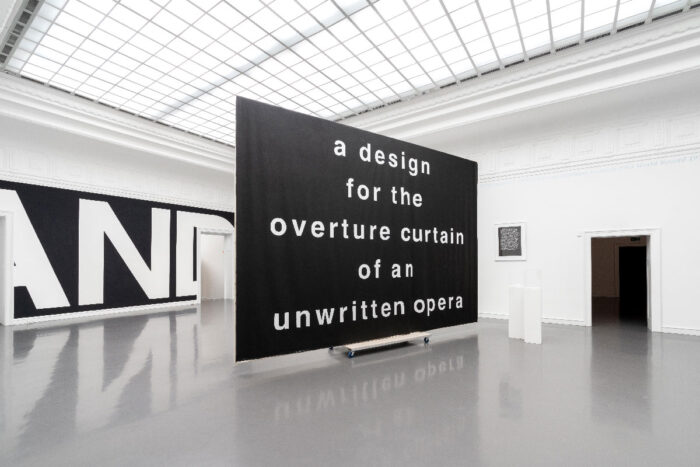
For Çerkez time passed fatally too fast, leaving behind a legacy of friendship and artistic branches that resulted in the exhibition Auditions for an Unwritten Opera at the Staatliche Kunsthalle Baden-Baden, a space where the grief for the premature disappearance of Çerkez is translated into a series of encounters with the artist’s life friends, Marco Fusinato and Callum Morton, and a new posthumous family of kins artists who inquire on conceptualism as emotional expression. According to the exhibition curator Misal Adnan Yıldız, this moment of commemoration is achieved by bringing together a similar identitarian and artistic freedom that provokes forms of reincarnation, re-memorization, and inscription in new frames, through the affective power of human memory.
The marble architecture of the neo-classical building of the Staatliche Kunsthalle Baden-Baden is layered with interventions by Mutlu Çerkez with Antonia Baehr, Juliet Carpenter, Jesse Darling, Julian Dashper, Egemen Demirci, Pedro Gómez-Egaña, Léuli Eshrāghi, Marco Fusinato, Delia Gonzalez, Özlem Günyol & Mustafa Kunt, On Kawara, Hanne Lippard, Callum Morton, Serkan Özkaya, Ruth Wolf-Rehfeldt, Jeff Wall Production, and Felix Gonzalez-Torres. The exhibition constellation exudes a form of goliardic melancholy similar to the experience of attending the funeral of a loved one, which however brings together friends who have not seen each other for many years. In this atmosphere of grief and lively creative energy, the human and artistic character of Çerkez is brought to life again. Through associations, echoes, and formal resonances, this operation of collective remembrance makes a statement on the very nature of exhibition-making, that is to signify the world through a plurality of perspectives, that by touching each other can propel affection toward new social and political destinations.
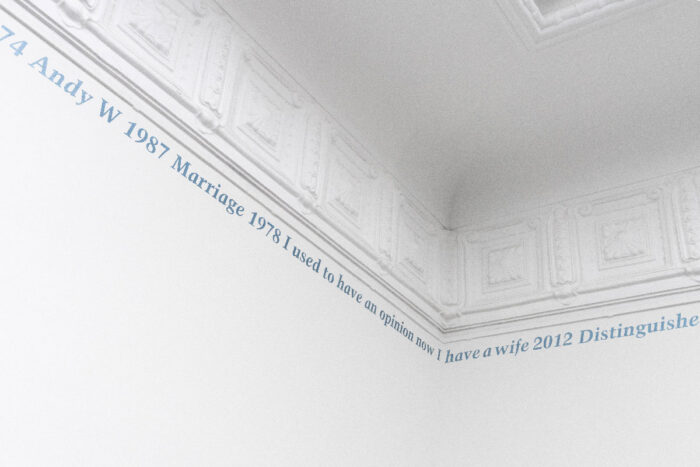
At the center of the main “stage”, this operation is introduced by Çerkez’s work A design for the overture curtain of an Unwritten Opera, Untitled: 15 January 2028, from the series A design for the overture curtain of an unwritten opera, (1999), a massive black curtain installed on a wheeled panel quoting the unresolved message “A design for the overture curtain of an unwritten opera.” The work is positioned as a key mark for the choreography of the exhibition, establishing the principle of rehearsal as the show’s guiding parameter. A rehearsal that deconstructs the relationship between stage and stalls, actors and audience, as it occurs around the curtains itself and transmits the creative gesture from one sense to the other, tickling the way narratives are brought together—in this case by absences.
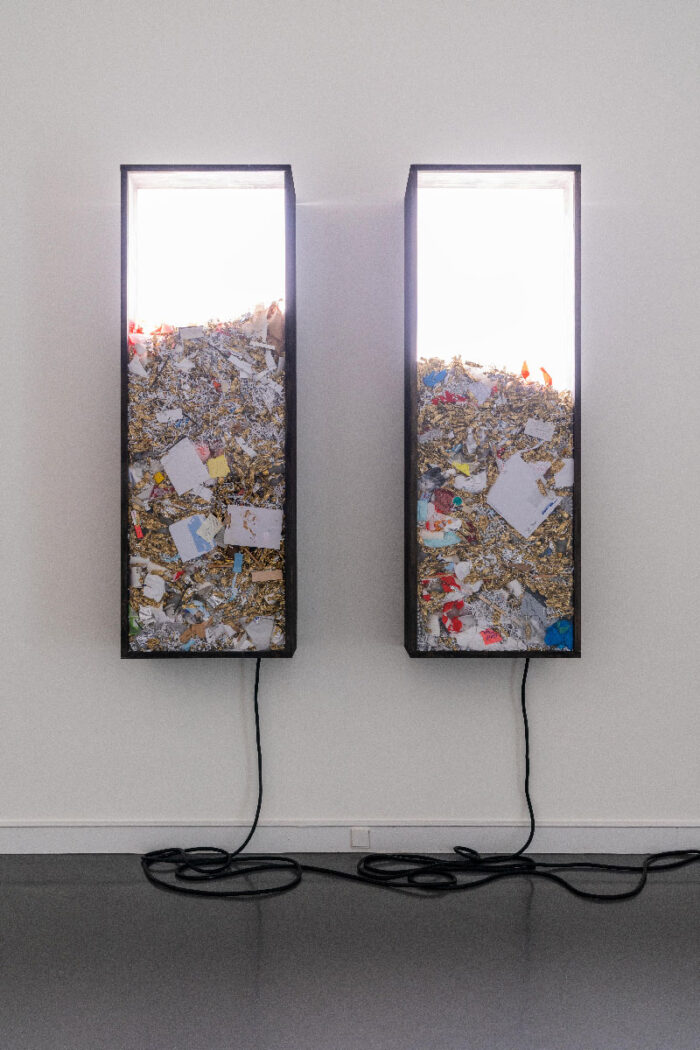
Surrounding the black curtain, Felix Gonzales Torres’s work Untitled (Portrait of the Magoons) (1993), an elliptical timeline marking a mix of political and personal events, proposes a method of portraying loved ones through time, by punctuating the fictionality of its linearity with the complexity of collective grief. A similar operation of time portraiture is put in place by Jesse Darling who restitutes an impression of Felix Gonzales Torres’s life by gathering into vitrines the recovered remains of his work. Reliquary (for and after Felix Gonzalez-Torres, in loving memory) (2022) explores the spoils of life through the traces left by institutional and interpersonal print. For Darling, the institutional, bureaucratic, and social components that shape the individual are a subject of long interest, a way to indirectly address the conundrum between individual agency and systemic pressure.
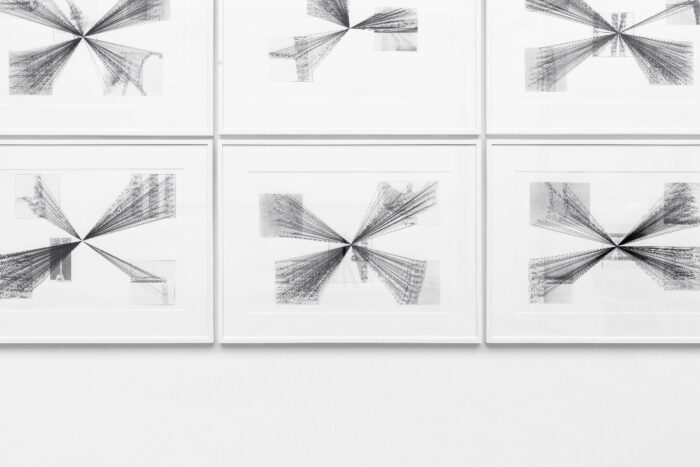
Marco Fusinato’s selection of drawings-scores from the series Mass Black Implosion (2017) pursues an operation of reassemblage of sparse sequences for the sake of evoking the not-there-yet or a form of scattered divinity. From each note, the artist draws a line to connect an arbitrarily chosen point as a proposition for a new composition. In The Last Question (2023), the bridging quality of sound is presented through an interplay between care and equilibrium. The endurance performance by Pedro Gómez-Egaña sees the artist standing in dim light operating a mysterious instrument, the helm of a boat or a wooden prosthesis, whose balance depends on Gómez-Egaña movements. The tender and pensive ritual is punctuated by the voice of the artist’s mother and musical passages inspired by Johannes Kepler’s early 1600s Harmonices Mundi scores propositions that turn the cosmos into a musical partiture.
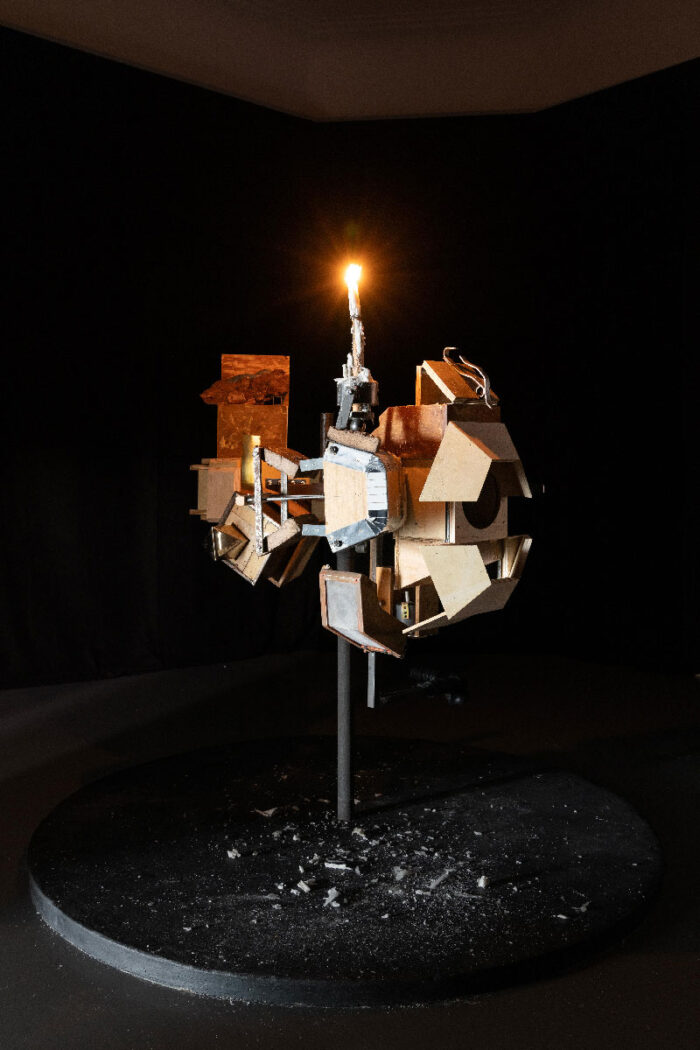
While the quantic representation of relations plays a conceptual deconstruction of social and individual matter, the voice of Hanne Lippard opens a space of intimacy that bounces off the works of Ruth Wolf-Rehfeldt. “Every day that passes you seem to have moved one time zone further away from me”—her voice whispers. In a room dedicated only to their intermedia dialogue, the poet and artist from Berlin presents her earlier audio piece Mistakes Made (2016) with the necessity of welcoming the audience into a space where confession, dialogue, closeness, and negotiation are created through verbal language. The sequence of intimate descriptions complements Wolf-Rehfeldt’s typewriting, a form of visual poetry where political vocabulary, environmental questions, and issues concerning human values and women’s rights are shaped in minute letters, to question their meaning in the very composition of language.
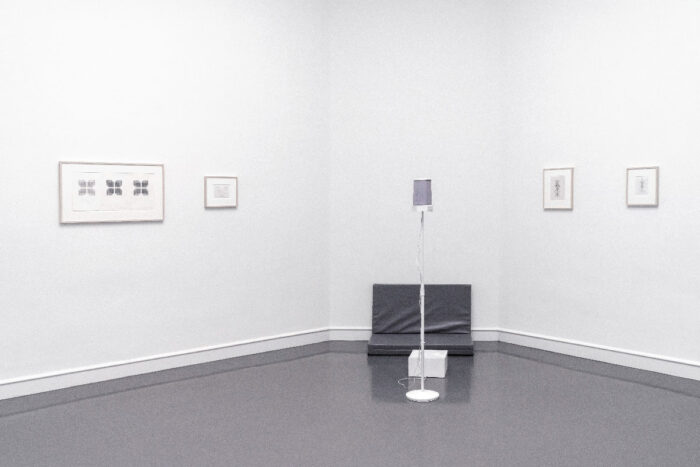
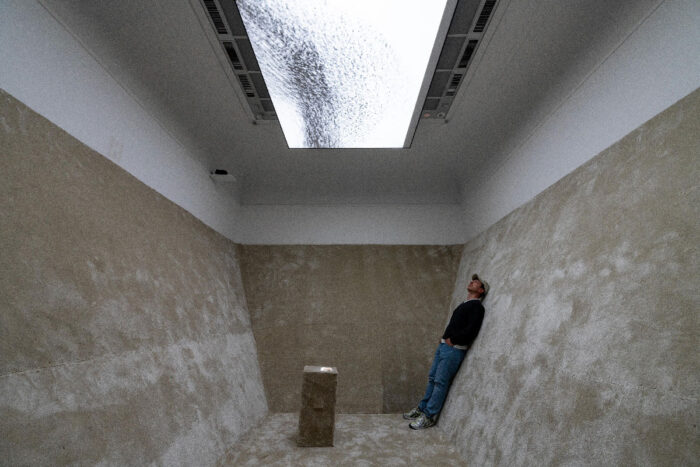
Juliet Carpenter’s film, in collaboration with Róisín Berg, The Sun is Not To Be Believed (2023) presents another form of sensorial organization, this time through moving images The abstract language of the work projects the visitor into a world of shadows, bringing the audience into an immanent perception of time, facilitated by the experience of the film into a muffle site-specific installation named Meantime (Duration is to Consciousness as Light is to the Eye). Whether cameras create subjects in ongoing re-negotiation with their identity in relation to collective memory, the cinematic translation of the friendship between Çerkez, Morton, and Fusinato is captured in the film Avalon (2005), which portrays the throwing of little rocks at the camera recording them, in a dream-like loop. A sort of documentation piece that highlights the consolidation of a bond through a repetitive, rehearsal gesture.
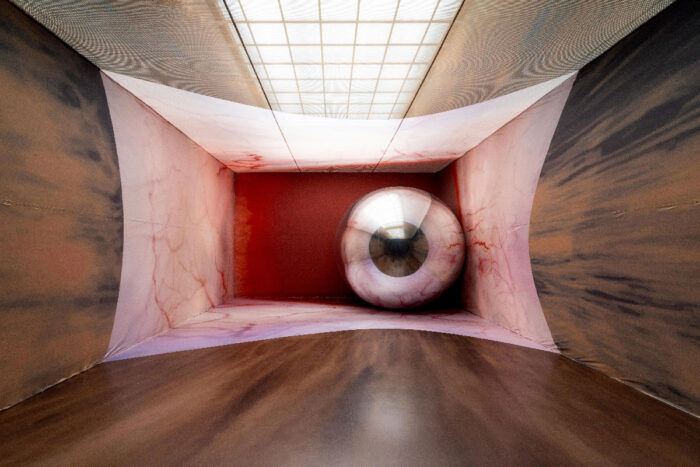
The multi-perspective exhibition Auditions for an Unwritten Opera is an operation that focuses on rehearsal as the ingredient of artistic language to create an enduring collectivity. The alleged exceptionalism of the artist is here deconstructed in a kaleidoscope of inputs and relations to extend their influence and to morph them in times and generations. But a meta-consideration of institutions is at stake here, to render the links between gazes, narratives, and dynamic relationships between bodies more flexible. Like Serkan Özkaya suggests in ni4ni v.4 (2022)—a gigantic ocular pupil that connects the human anatomy with the art institution, as an all-encompassing gaze that connects and processes rather than controlling the whole life’s journey.


